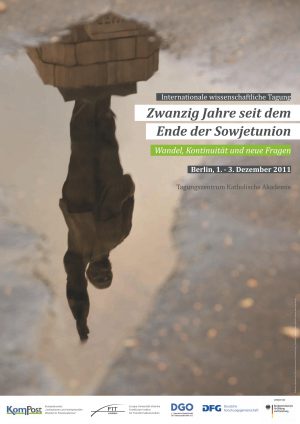Conference organized by the Project Network “Institutions and Institutional Change in Postsocialism“, German Association for East European Studies (DGO) and Frankfurt Institute for Transformation Studies (FIT), Berlin 1-3 December 2011
 The dissolution of the Soviet Union at the end of 1991 marked the collapse of a state, of an empire, and of a project of an alternative modernity. Initially, the collapse of the “Soviet civilization” seemed to provide an opportunity for the countries of the CEE and Eurasia to arrive in the West with its capitalist democracies, its liberal individualist values, and a global pax americana. History as a struggle between ideologies appeared to have reached its (liberal) end. This was an error of judgement, however. Since then, new, non-Western powers and global threats have emerged, and the historico-political region “Eastern Europe” has disappeared. Today, this region is more diverse than any other region in the world: while most of the countries of Central and Southeast Europe adapt successfully to the liberal standards of the West and are now members of the European Union, the post-Soviet states have embarked on a search for alternatives. Here, we encounter authoritarian and semi-authoritarian regimes and state-run capitalist economies, new regional cooperation and security alliances, as well as attempts to develop local models or to learn from other non-Western experiences, especially from China and the Asian “tigers”.
The dissolution of the Soviet Union at the end of 1991 marked the collapse of a state, of an empire, and of a project of an alternative modernity. Initially, the collapse of the “Soviet civilization” seemed to provide an opportunity for the countries of the CEE and Eurasia to arrive in the West with its capitalist democracies, its liberal individualist values, and a global pax americana. History as a struggle between ideologies appeared to have reached its (liberal) end. This was an error of judgement, however. Since then, new, non-Western powers and global threats have emerged, and the historico-political region “Eastern Europe” has disappeared. Today, this region is more diverse than any other region in the world: while most of the countries of Central and Southeast Europe adapt successfully to the liberal standards of the West and are now members of the European Union, the post-Soviet states have embarked on a search for alternatives. Here, we encounter authoritarian and semi-authoritarian regimes and state-run capitalist economies, new regional cooperation and security alliances, as well as attempts to develop local models or to learn from other non-Western experiences, especially from China and the Asian “tigers”.